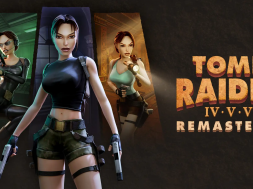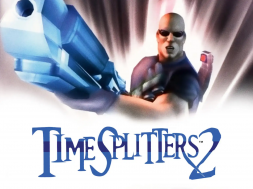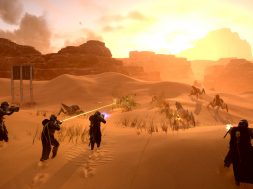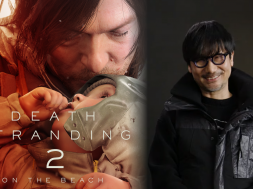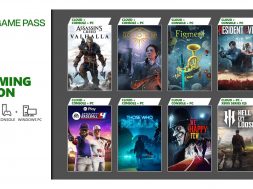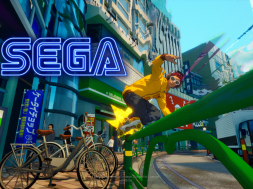
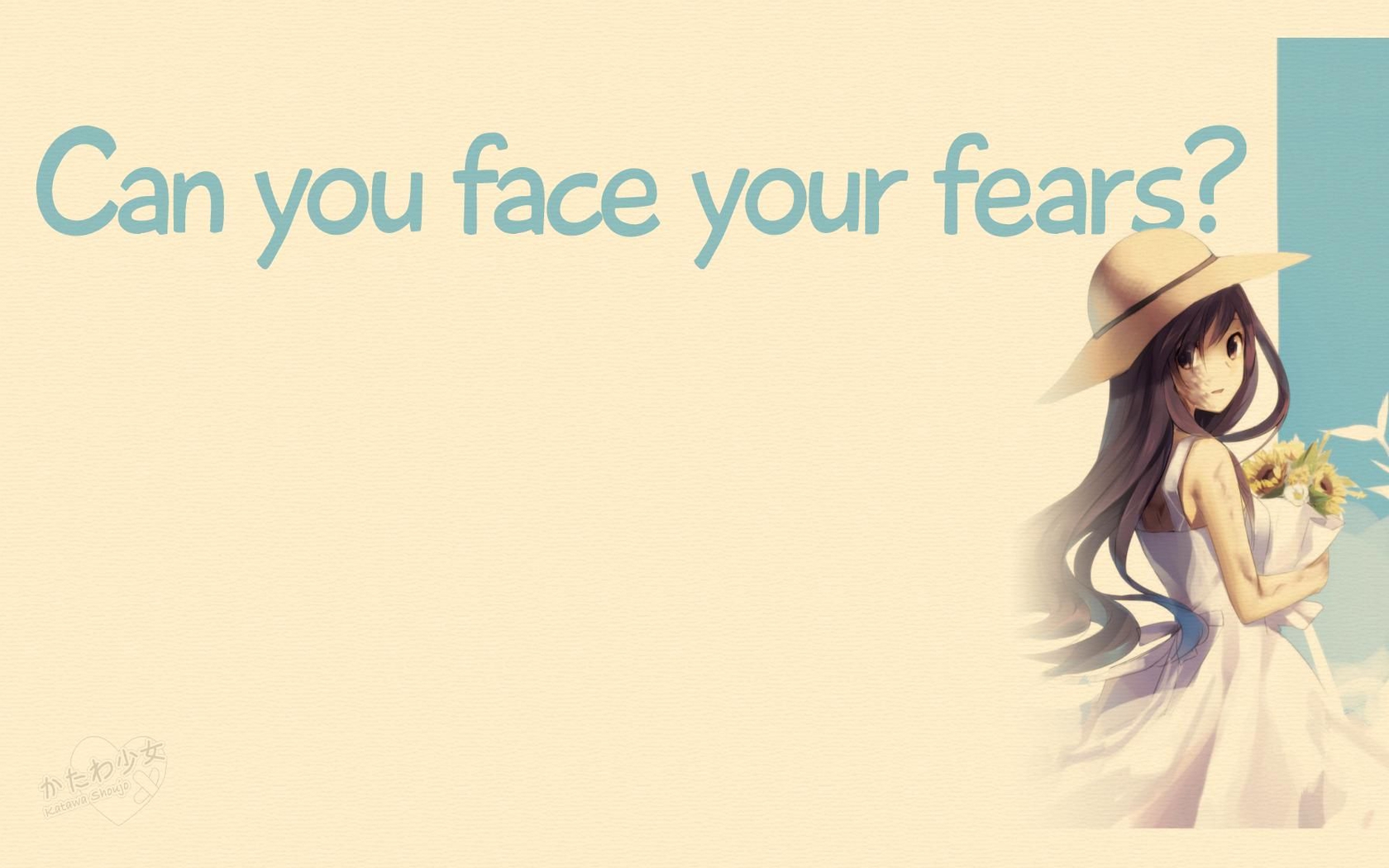
What makes a good score? Well, that depends on what’s important to you.
Scores are multifaceted things, the best ones even more so, and nailing the magic of their appeal down to one thing or another is, more often than not, a thankless task. Whether you want to talk about technical skill, style, the signature of certain producers, how the music interacts with the content, how accurately it represents that content, how well it’s performed, recorded, mixed and arranged, or even what you saw the composer was having for lunch on their instagram, there are an endless amount of topics to discuss with regards to scores.
Today’s High Score is devoted a game where the music doesn’t play an integral role in the gameplay. It’s not particularly impressive in terms of its instrumentation and it doesn’t interact with the game on anything more than a narrative (and very basic click-and-cue) level. ‘So why is it worth talking about?’, I hear you ponder. Well, because it’s a perfect example of a score that doesn’t need to do any more than it does. It’s melodies are so simple, so elegant and affecting, that It doesn’t need to be pompous or pretentious in their execution. Katawa Shoujo has a powerful score, just not in the way you’re probably used to.
*Disclaimer: I’m on record as being a relentless Katawa Shoujo fanboy, so I won’t be talking too much about the game itself. Typing through the tears as I relive it would slow my writing progress considerably. If, however, you want to know more about the game itself, feel free to take a look at this Emotion in Gaming piece I wrote in it during the summer*
There are a whole heap of internet memes devoted to Katawa Shoujo but few among them are as accurate as this one: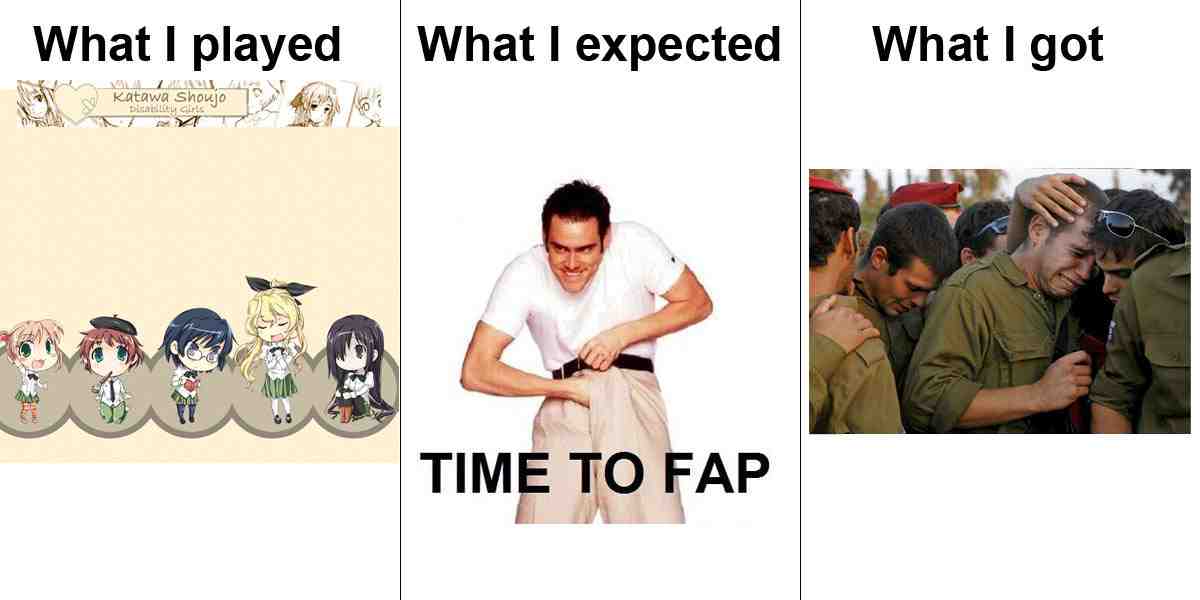
Whatever you were expecting, I don’t think anyone who fired up KS, even latecomers like me who had been warned, expected the emotional roller-coaster they were about to jump on. As they say though, hindsight is twenty-twenty and looking back on it now the menu music, Wiosna, really should have tipped us off. A sprinkling of bittersweet melody guides us gently into a short but sweet guitar and piano duet where composer Sebastien Skaf, a.k.a, NicolArmarfi, throws up the first red flag for what’s to come. The first time I heard the soft, subdued plucking that carries this piece, I liked it. I thought it was nice. I had no idea it would turn out to be the funeral march for my poor, unsuspecting heart.
Being a visual novel game, KS has a TONNE of music running through it and while most of it is incidental, it’s remarkable just how much of it actually manages to stick in your head. This piece, Daylight, doesn’t really have any narrative significance and is pretty much just ‘strolling around’ music. The thing is, it’s perfect ‘strolling around’ music. A simple melody, some pretty standard, homely chord changes and some delicate percussion all come together for a piece that doesn’t overstep it’s mark but perfectly evokes the ephemeral carefree feeling of just wandering around campus on a day off school. The wind is rustling the trees, the sun is colour grading the kingdom and life is good. Until Katawa Shoujo decides it’s time to rip out your heart and feed it to you in small, delicious pieces.
Truth be told there are countless big emotional piano numbers in Katawa Shoujo. Each of the main girls even has their own little piano theme and playing any one of them would be enough to reduce any KS fan to a quivering pile of warm, salty tears. I’m gonna go with this one though, Moment of Decision, which usually plays not when you’re about to make a decision, but when you’ve already made the wrong one. I swear, this piece of music has given me more moments of spontaneous panic than all of the Silent Hill games combined.  You’re probably sensing a pattern at this stage. These pieces all have, at their core, a memorable, aesthetically pleasing melody. This is a recurring thing about Skaf’s work on KS. You’ll often find the entire soundtrack competing for space in your head, as if your brain has just stuck the album on shuffle and can’t make up it’s mind as to which track it likes best. Like Wisona, or the whole score in general, much of Moment of Decision’s emotional weight comes from when and why you hear it.
You’re probably sensing a pattern at this stage. These pieces all have, at their core, a memorable, aesthetically pleasing melody. This is a recurring thing about Skaf’s work on KS. You’ll often find the entire soundtrack competing for space in your head, as if your brain has just stuck the album on shuffle and can’t make up it’s mind as to which track it likes best. Like Wisona, or the whole score in general, much of Moment of Decision’s emotional weight comes from when and why you hear it.
One or two bad endings and you’ll grow to dread it as much as I did. If that’s not an example of an effective score, I don’t know what could be.
I sometimes wonder if Wagner had any idea of the influence that his leitmotif – melodies assigned to specific characters or themes and used to invoke them throughout an opera – would go on to have. Even in video games – which I don’t think Wagner himself could have known about, although I’m sure he’d claim otherwise – leitmotif are almost a given in just about every game where music is present. The most famous example would be the immeasurable amount of Final Fantasy character themes and while Skaf never does anything as explicit as naming his themes after the characters their associated with, there are certain pieces of music that only reveal themselves when certain characters are around. Take this chirpy little number, Standing Tall, for instance. You’ll only hear the chiming synths and angular rhythm of what is, undoubtedly, Emi’s theme whenever she’s around. While each of the girls have their own unique tracks (even Hisao has one in Caged Heart), it’s Emi’s that does the best job of accurately representing her character. Bright and optimistic in it’s instrumentation and melody, if a little unsteady on its feet, Standing Tall sums her up pretty well.
Every score has one piece that, for whatever reason, resonates with the audience more than the others. For Katawa Shoujo, that piece is Red Velvet. This jazzy piece became so beloved by the fans that Skaf eventually re-did it, improving the instrumentation along with some other minor tweaks. It’s not hard to see why it’s so popular, Red Velvet is a real gem. Another beautiful melody sits at its heart but what makes this track really memorable are its ‘improv’ sections, where piano, clarinet and double bass all get a shot at taking that melody off in different directions. For a piece of music that loops infinitely until you trigger a change, these improv sections are loose enough to stave off habituation and you’ll nearly always hear a cheeky little turn or triplet that you didn’t catch the last time.
*****
You might have noticed that ‘less-than-impressive’ instrumentation I talked about in my opening spiel. Katawa Shoujo was developed using the freeware Ren’Py engine, which puts some limitations on what any given composer can do in terms of bit depth and sample rates. The only real complaint I have about Skaf’s superb score is that it is, almost exclusively, powered by some pretty sub standard midi instruments. It’s to Skaf’s eternal credit then that so much of that goes completely over your head as his melodies cascade over your very soul in a wave of conflicting and unrelenting emotions. What you’re hearing becomes irrelevant in the face of what you’re feeling and when all is said and done, isn’t that what music is really about?




